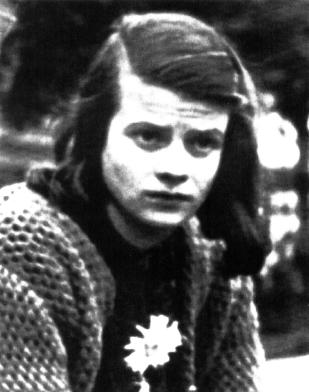Sophie Scholl (Sophie Magdalena Scholl)

Sophie Scholl was brought up a Lutheran. She entered junior or grade school at the age of seven, learned easily, and had a carefree childhood. In 1930, the family moved to Ludwigsburg and then two years later to Ulm where her father had a business consulting office. In 1932, Scholl started attending a secondary school for girls. At the age of twelve, she chose to join the Bund Deutscher Mädel (League of German Girls), as did most of her classmates, but her initial enthusiasm gradually gave way to criticism. She was aware of the dissenting political views of her father, of friends, and also of some teachers. Political attitude had become an essential criterion in her choice of friends. The arrest of her brothers and friends in 1937 for participating in the German Youth Movement left a strong impression on her. She had a talent for drawing and painting and for the first time came into contact with a few so-called “degenerate” artists. An avid reader, she developed a growing interest in philosophy and theology.
In spring 1940, Sophie Scholl graduated from secondary school, where the subject of her essay was “The Hand that Moved the Cradle, Moved the World”. Being fond of children, she became a kindergarten teacher at the Fröbel Institute in Ulm-Söflingen. She also had chosen this kindergarten job hoping that it would be recognized as an alternative service to Reichsarbeitsdienst (National Labor Service), a prerequisite to be admitted to the university. This was not the case, though, and in spring 1941 she began a six-month stint in the auxiliary war service as a nursery teacher in Blumberg. The military-like regimen of the Labor Service caused her to think very hard about the political situation as well as to begin practicing passive resistance. After her six months in the National Labor Service, in May 1942, she enrolled at the University of Munich as a student of biology and philosophy. Her brother Hans, who was studying medicine there, introduced her to his friends. Although this group of friends eventually was known for their political views, they initially were drawn together by a shared love of art, music, literature, philosophy, and theology. Hiking in the mountains, skiing, and swimming were also of importance to them. They often attended concerts, plays, and lectures together. In Munich, Sophie Scholl met a number of artists, writers, and philosophers, particularly Carl Muth and Theodor Haecker, who were important contacts for her. The question they pondered the most was how the individual must act under a dictatorship. During the summer vacation in 1942, Scholl had to do war service in a metallurgical plant in Ulm. At the same time, her father was serving time in prison for having made a critical remark to an employee about Hitler.
Based upon letters between Sophie Scholl and her boyfriend, Fritz Hartnagel (reported and analyzed by Gunter Biemer and Jakob Knab in the journal Newman Studien), she had given two volumes of Cardinal John Henry Newman’s sermons to Hartnagel when he was deployed to the eastern front in May 1942. This discovery by Jakob Knab shows the importance of religion in Scholl’s life and was highlighted in an article in the Catholic Herald in the UK. The White Rose was founded after Scholl and others read a stern anti-Nazi sermon by Clemens August Graf von Galen (the “Lion of Münster”), the Roman Catholic Bishop of Münster. Although she was Lutheran, Scholl was motivated by it. She and they had been horrified by Hartnagel’s reports of German war crimes on the Eastern Front where Hartnagel witnessed Soviet POWs being shot in a mass grave and learned of mass killings of Jews. Her correspondence with Hartnagel deeply discussed the “theology of conscience” developed in Newman’s writings. This is seen as her primary defense in her transcribed interrogations leading to her “trial” and execution. Those transcripts became the basis for a 2005 film treatment, Sophie Scholl – The Final Days.
The core members initially included Hans Scholl (Sophie’s brother), Willi Graf, and Christoph Probst. In early summer 1942, this group of young men co-authored six anti-Nazi political resistance leaflets. Contrary to popular belief, Sophie Scholl was not a co-author of the articles. Initially her brother had been keen to keep her unaware of their activities, but once she discovered them, she joined him and proved valuable to the group because as a woman, her chances of being randomly stopped by the SS were much smaller. Calling themselves the White Rose, they instructed Germans to passively resist the Nazis. She and the rest of the White Rose were arrested for distributing the sixth leaflet at the University of Munich on 18 February 1943. On 22 February 1943, Sophie Scholl, her brother Hans, and their friend Christoph Probst were found guilty of treason and condemned to death. They were all beheaded by a guillotine by executioner Johann Reichhart in Munich’s Stadelheim Prison only a few hours later, at 17:00 hrs. The execution was supervised by Walter Roemer, the enforcement chief of the Munich district court. Prison officials, in later describing the scene, emphasized the courage with which she walked to her execution.
Born
- May, 09, 1921
- Forchtenberg, Germany
Died
- February, 22, 1943
- Munich, Germany
Cause of Death
- execution by beheading
Cemetery
- Friedhof am Perlacher Forst
- Munich, Germany



